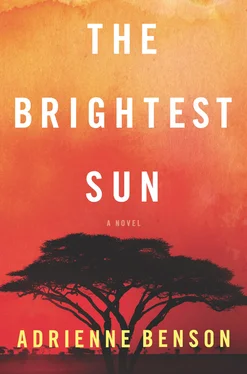Simi couldn’t remember the details anymore. When her father entered, her brother was in the middle of speaking. What story was her brother telling? Simi only remembered that he stopped, mid-word, when their father burst into the hut. This is where her memory skipped from a feeling of contentment to one of fear.
“Where is the money?” Her father’s voice. Angry and urgent. “You have been stealing money.” His voice stank of honey beer.
Simi’s mother was a good wife. Simi knew that. She’d never seen her mother disagree with her father. But now, Simi’s mother turned to him and said quietly, “I have not taken your money. I have given you many sheep and goats.”
Simi remembered sliding closer to her mother. She remembered the warmth from her mother’s skin, and how suddenly it disappeared when her father leaned down and pulled her mother up.
“You are a liar, wife!”
Simi watched as her father dragged her mother from the hut. She couldn’t move. Her brother jumped up and disappeared through the door. There was scuffling outside. Simi heard her mother make a guttural sound and then she heard a thud. Suddenly her father was back, standing above Simi. His red eyes, foul breath and the angry quivering of his lips made him look inhuman, like a monster or a wild beast.
He leaned down slowly and, when his face was only inches from Simi’s, he growled.
“You, child, find me my money.”
Later Simi would cry and wonder why she did what she did. But at that moment, her monster father took all the thoughts from her head. It was just an empty cave.
“It is there,” she whispered, pointing under the cowhide bed.
Her father pivoted, still leaning low, and stretched a long arm out into the space under the bed. His face instantly changed when his fingers felt the tin box. He smiled wide, stood up, tucked the box under his arm and was gone.
Simi crept out of the hut. She thought her mother might be there, but she wasn’t. It was dark and she could hardly see the sleeping cattle. Not even the stars were shining. Simi kept the fire alive, and knowing her mother would want something warm to drink when she returned, she put a pot of water on the fire for tea. She added the sugar and milk and took it off the heat when it boiled. The tea grew cool, and the milk formed a skin on top, and still her mother didn’t return. Finally, unable to keep her eyes open, Simi curled up on the bed and fell asleep. She woke again when her mother returned and climbed into the bed next to her. Simi listened to her mother breathing for a long time. She was ashamed of what she’d done.
The next morning, Simi woke up early. Her mother was stirring chai in the pot and ladled out a hot cup that she handed to Simi. Her face was calm.
Simi watched her mother’s face carefully, desperate to know if she was angry with Simi or if, Simi hoped, she understood the choice Simi made. She found it impossible to refuse her father. Surely her mother understood.
“It was your school money, Simi.”
Shame bubbled up in Simi’s mouth. It was impossible to drink her tea.
“I wanted you to learn so when you married, you could be smarter than your husband. A husband can beat his wife, he can take what she has, but he can never take the things she knows.”
Simi stood up. It was almost time to leave for school. She glanced at the hook where her uniform hung. It was empty.
“Your father wanted that, too. I gave it to him.”
The loss was a blow to her chest. Simi fought to find air to breathe.
Her mother continued, “He has also told the laiboni that you are to be cut.”
How fast everything changed then. Simi was fifteen. Many of her age-mates were already women—circumcised and married and gone from her manyatta. The last several years were dry; Simi’s father’s herds had thinned, and the land grew hard. The bushes and trees the women cut for firewood and building were less and less plentiful. They had to walk farther to get them and, without tree and grass roots to hold the soil together, when it did rain, it merely turned the land to mud. All the seeds and tiny grasses were gone. Money was harder to find and, therefore, food less plenty. Simi would bring a bride price of at least two cows and two goats and one less mouth to feed.
Her mother changed. In the evenings, she didn’t ask Simi’s brother about what he was learning in school. Simi didn’t ask him, either. She tasted bitterness every time she thought of him writing in his exercise book and learning things while she cut wood and washed clothes in the trickle of water that used to be a river. Instead, each night they sat quietly, staring into the fire and sipping tea.
The night before Simi’s emurata, though, her mother took her hand and said, “I was a weak wife.” Then she reached up and unlatched her favorite necklace from her own neck. It was a stunning piece, wide and flat and shimmering with beads in all shades of blue and green. Simi remembered watching her mother make it, painstakingly selecting the perfect bead to sew on next. It was the only piece she’d refused to sell. Simi felt her mother’s rough hands slide the necklace around Simi’s neck and fix the clasp shut.
“You are my daughter,” her mother told her. “And now you are a woman and soon a wife. Your life will be like mine, but maybe not your children’s. Maybe they will have a wider sky.”
Simi looked at her feet. She knew her mother was still bitterly disappointed in her, in the way she’d ruined the dream her mother had had—to send Simi to school and delay marriage. This was a gesture that her mother had forgiven her, maybe, but had not forgotten.
Simi was resigned to marriage. Even with her schooling, it was inconceivable that she wouldn’t follow the path of all the other women before her. She was lucky that the man who chose her was the son of the village elder, the one whose opinion mattered and to whom others paid respect. Her husband was a pleasant man and had an easy rapport with all his wives and his children. Simi was the third wife.
Simi was married for one year before her husband began asking if she was unlucky. He asked with pity in his eyes—a childless woman is a sign of chaos; disorder in the way the world always works. After all, of what importance is a woman without a child? A woman is to provide children; if she cannot give babies, what can she give?
There were things to be done in this situation. The week-long silent praying to N’gai, the eating of lambs, the visit to the oreteti tree in the forest, the slaughtering of the ox, the dousing with milk and the eating of fat. For two years Simi consulted with the village doctor. Four times, she hoped. And four times the babies, unformed, left her. The other women, especially the other wives, looked at her through eyes tinged with suspicion. An unlucky woman could veil the whole village with her curse. And what was unluckier than a woman who couldn’t bear children? God only made perfect things; imperfections were doled out in life only to the people who deserved them. A childless wife was an imperfection of the highest degree—a stunning slight from God. Some husbands cast out their infertile wives to save themselves from the stain of bad luck she might bring to the family. Some villages refused to allow unlucky women to stay.
Simi’s husband didn’t tell her the American was coming. She found out through his first wife, Isina, when the women all gathered at the river to wash their clothes.
“Why is the muzungu coming here?” someone asked. “To steal our men?” The women laughed.
“How will she live here when she cannot speak to us?” someone else asked.
Nalami, Isina’s daughter, turned to Simi. Her hands were soapy with lye, and her palms red and chapped. She paused and then said slowly, “Simi, you will be the only one who will be able to talk to her.” The other women nodded and murmured.
Читать дальше












